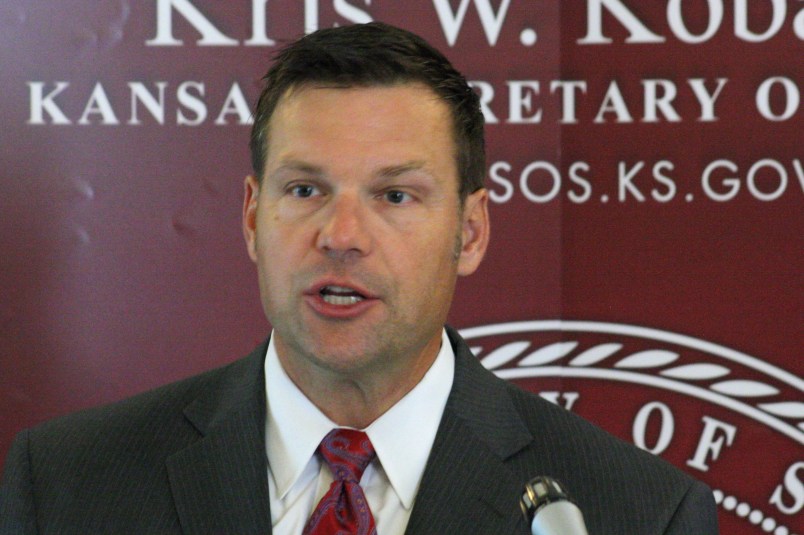Well, that didn’t take long.
Just weeks after Kansas and Arizona made clear their intentions to move ahead with two-tier voting systems, legal efforts are being mounted to fight those plans.
On Thursday, the American Civil Liberties Union filed a lawsuit in Kansas directly challenging the state’s two-tier system, where voters who show no proof of citizenship would be allowed only to vote in federal elections, not state or local elections. At the same time, the Brennan Center for Justice and the League of Women Voters of the United States teamed up to join the ongoing federal case that prompted Kansas and Arizona to start flirting with two tiers in the first place.
The ACLU case is straightforward. Filed in the Third Judicial Circuit in Topeka, Kan., the complaint argues that two-tier voting “divides registered voters in Kansas into two separate and unequal classes, with vastly different rights and privileges.” According to USA Today, nearly 18,000 voters in Kansas who registered for the first time this year can vote in federal elections but not in state or local ones because they have not submitted citizenship documents.
“It all comes back to voters’ equality,” the ACLU’s Molly Rugg wrote in a blog post on Thursday. “Kansas cannot treat equally qualified voters unequally on the whim of the Secretary of State. If you are qualified to vote in the presidential election, you are certainly qualified to vote in Kobach’s re-election bid next year.”
In both Kansas and Arizona, plans for two-tier systems began in the wake of Supreme Court’s June ruling in Arizona v. Inter Tribal Council, the legal battle over Arizona’s 2004 voter identification law. While the Supreme Court blocked the law, both Arizona and Kansas have focused on the wiggle-room the court left them. In August, the two states joined together to sue the U.S. Election Assistance Commission (EAC), the agency which maintains the federal voter registration form, in an attempt to force the agency to add proof-of-citizenship language to the state-specific instructions on the federal form. (Each state has state-specific instructions on the federal form.) And in the meantime, officials in both states made preparations for two-tiered systems.
“The irony here is that the ACLU is suing Kansas to stop something that I, too, am trying to prevent, which is a two-tier system,” Kansas Secretary of State Kris Kobach told USA Today.
That’s where the Brennan Center for Justice and the League of Women Voters of the United States come in. On behalf of the League of Women Voters, the Brennan Center on Thursday submitted a motion to intervene as defendants in Kansas and Arizona’s case against the EAC. As it stands, if the states win the case, they would no longer need two-tier voting to impose proof of citizenship requirements. If they lose, then two-tier voting’s fate would depend, at least in part, on the ACLU case.
“The League has worked tirelessly to remove barriers from voting and advocate on behalf of the voting rights of all Americans,” Elisabeth MacNamara, national president of the League of Women Voters, said in a written statement. “The gains that the League has worked for are now being threatened by the documentary proof-of-citizenship requirements that Arizona and Kansas seek to force into the Federal Form.”
While the states’ federal case against the EAC doesn’t directly deal with the two-tier voting system, according to Wendy Weiser, who directs the Brennan Center’s Democracy Program and is an attorney on the case, the stakes there could be even higher. According to Weiser, questions being raised by Kansas and Arizona in the case could threaten the national “motor voter” law, which made it easier to register to vote, as well as “a whole host of regulations past and future that have never before been questioned.”
“It’s very clear that they’re challenging the statute itself, and Congress’ authority, and they’re raising a real novel theory that has never before been raised or adopted by any court,” Weiser told TPM on Friday.






